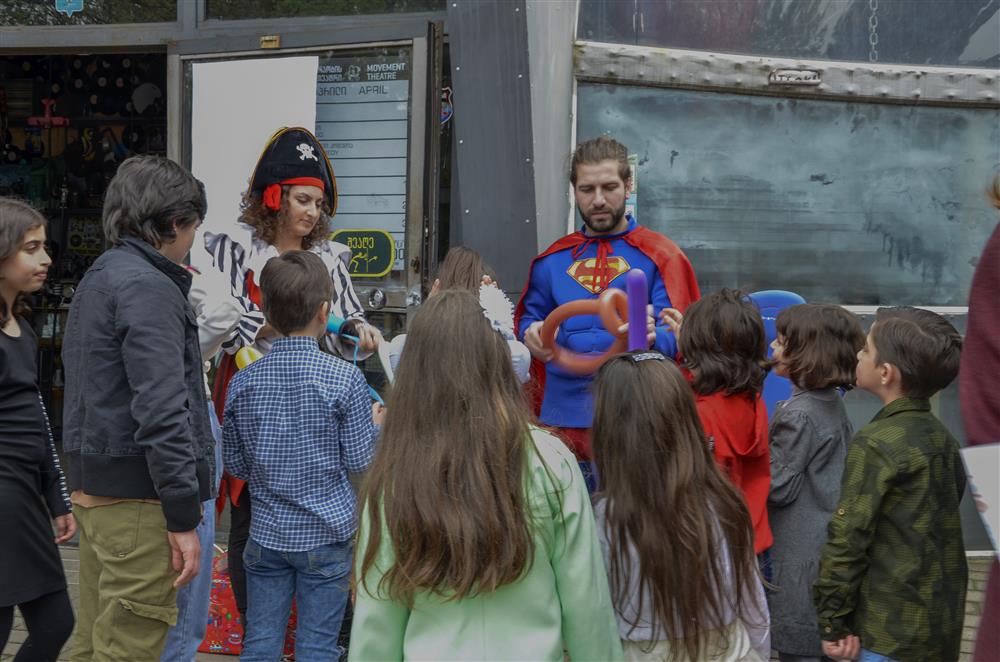On April 12, World Vision Georgia (WVG ) organizes the launch event of the project “Beyond Institutional Care” to strengthen the alternative care system and complete the deinstitutionalization process of non-regulated childcare institutions in Georgia.
The project is carried out by World Vision Georgia with the support of the European Union, in partnership with the Agency of State Care and the Assistance to Victims of Human Trafficking under the Ministry of Internally Displaced Persons from the Occupied Territories, Labour, Health and Social Affairs of Georgia. Within the frames of the project, small group homes will be built, renovated, equipped and capacitated. Children will be reintegrated into biological families where deemed appropriate and supported with placements in foster care families if necessary.
The event was opened by Ekaterine Gurgenadze - Director of World Vision Georgia, that was followed by speeches by Catalin Gherman - Deputy Head of Cooperation of the EU Delegation to Georgia, Tamila Barkalaia - Deputy Minister of IDPs from Occupied Territories, Labour, Health and Social Affairs of Georgia, and Meri Maghlaperidze - Director of LEPL Agency For State Care And Assistance For the (Statutory) Victims of Human trafficking.
“We have supported substantially over the last years the promotion and protection of child rights, including the development and implementation of the Child Rights Code. We are ready to continue working together with our partners from World Vision, Ministries as well as municipalities and civil society to further support children and ensure their wellbeing,” – said Catalin Gherman.
“This project is a continuation of the great initiative that has been implemented by World Vision for years in cooperation with the State to strengthen the child welfare and care system in Georgia. On this path, our long-term partner is European Union and with their support, we managed to achieve significant success. We dedicated the opening event of the project to the International Day for Street Connected Children, to remind society once again that these children are still on the streets and it is vital to create such services, that allow them to live and develop in proper conditions. Our aim is to ensure the children under institutional care receive quality services and various needs of children under risk are met,” - mentioned Ekaterine Gurgenadze.
“Our mission is to support families and strengthen alternative care services, that are close to biological family reality. We continue to work for completing the deinstitutionalization process and advancing alternative services for children,”- said Tamila Barkalaia.
With this event, we also mark the International Day for the Street Connected Children, to raise awareness about the millions of street-connected children all around the world, recognize their rights and achieve equality for them. Children who live and work in the streets, often are “invisible” to the system and society, therefore, they are in need of care and support to develop appropriately and have a better future. After the presentation of the project the children from the centres of WVG presented music and art performance to the audience, received presents and engaged in entertaining activities organized for them. The event was hosted by Movement Theatre.
Since 2013, World Vision Georgia provides daily support to 100 children living and working in the streets through the Day Care Centres and 24/7 shelters in Tbilisi and Kutaisi. Through our programs, we support the Government of Georgia in the implementation of quality alternative care services for the protection and rehabilitation of the most vulnerable children who are at risk or under state care.

More about the project
The project “Beyond Institutional Care” builds upon the results of the EU-funded project “Reinforcing Child Welfare and Protection System in Georgia” implemented from 2019 to 2022. The project aims to finalise the deinstitutionalization process and replace large-scale institutions with alternative, family-based care services. In order to move child welfare and protection system beyond institutional care, long-term care services will be established for children affected by the deinstitutionalization of non-regulated institutions. Additionally, within the frames of the project, small group homes will be built, renovated and equipped for children residing in the non-regulated institutions; children will be reintegrated to biological families where deemed appropriate and supported with placements in foster care families if necessary. Foster care is the best alternative to biological families, subsequently, foster parents should receive continuous support to be able to secure the basic and development needs of children who are in especially difficult circumstances. Thus, project activities will also focus on training and advancing the foster parents as well as municipal social workers to deliver better preventive and rehabilitative services. Alternative care system mechanisms will be strengthened to meet various needs of children under risk and manage the challenging and risky behaviour of children beneficiaries by specifically developed training modules.
We believe that the project will significantly contribute to the ongoing child welfare reform in Georgia and bring positive changes in the lives of vulnerable children.


